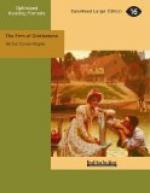It is possible that his son’s surmise was right, and that the gaunt, unemotional African merchant felt an unwonted heartache as he hailed a hansom and drove out to his friend’s house at Fulham. He and Harston had been charity schoolboys together, had roughed it together, risen together, and prospered together. When John Girdlestone was a raw-boned lad and Harston a chubby-faced urchin, the latter had come to look upon the other as his champion and guide. There are some minds which are parasitic in their nature. Alone they have little vitality, but they love to settle upon some stronger intellect, from which they may borrow their emotions and conclusions at second-hand. A strong, vigorous brain collects around it in time many others, whose mental processes are a feeble imitation of its own. Thus it came to pass that, as the years rolled on, Harston learned to lean more and more upon his old school-fellow, grafting many of his stern peculiarities upon his own simple vacuous nature, until he became a strange parody of the original. To him Girdlestone was the ideal man, Girdlestone’s ways the correct ways, and Girdlestone’s opinions the weightiest of all opinions. Forty years of this undeviating fidelity must, however he might conceal it, have made an impression upon the feelings of the elder man.
Harston, by incessant attention to business and extreme parsimony, had succeeded in founding an export trading concern. In this he had followed the example of his friend. There was no fear of their interests ever coming into collision, as his operations were confined to the Mediterranean. The firm grew and prospered, until Harston began to be looked upon as a warm man in the City circles. His only child was Kate, a girl of seventeen. There were no other near relatives, save Dr. Dimsdale, a prosperous West-end physician. No wonder that Ezra Girdlestone’s active business mind, and perhaps that of his father too, should speculate as to the disposal of the fortune of the dying man.
Girdlestone pushed open the iron gate and strode down the gravel walk which led to his friend’s house. A bright autumn sun shining out of a cloudless heaven bathed the green lawn and the many-coloured flower-beds in its golden light. The air, the leaves, the birds, all spoke of life. It was hard to think that death was closing its grip upon him who owned them all. A plump little gentleman in black was just descending the steps.
“Well, doctor,” the merchant asked, “how is your patient?”
“You’ve not come with the intention of seeing him, have you?” the doctor asked, glancing up with some curiosity at the grey face and overhanging eyebrows of the merchant.
“Yes, I am going up to him now.”
“It is a most virulent case of typhoid. He may die in an hour or he may live until nightfall, but nothing can save him. He will hardly recognize you, I fear, and you can do him no good. It is most infectious, and you are incurring a needless danger. I should strongly recommend you not to go.”




